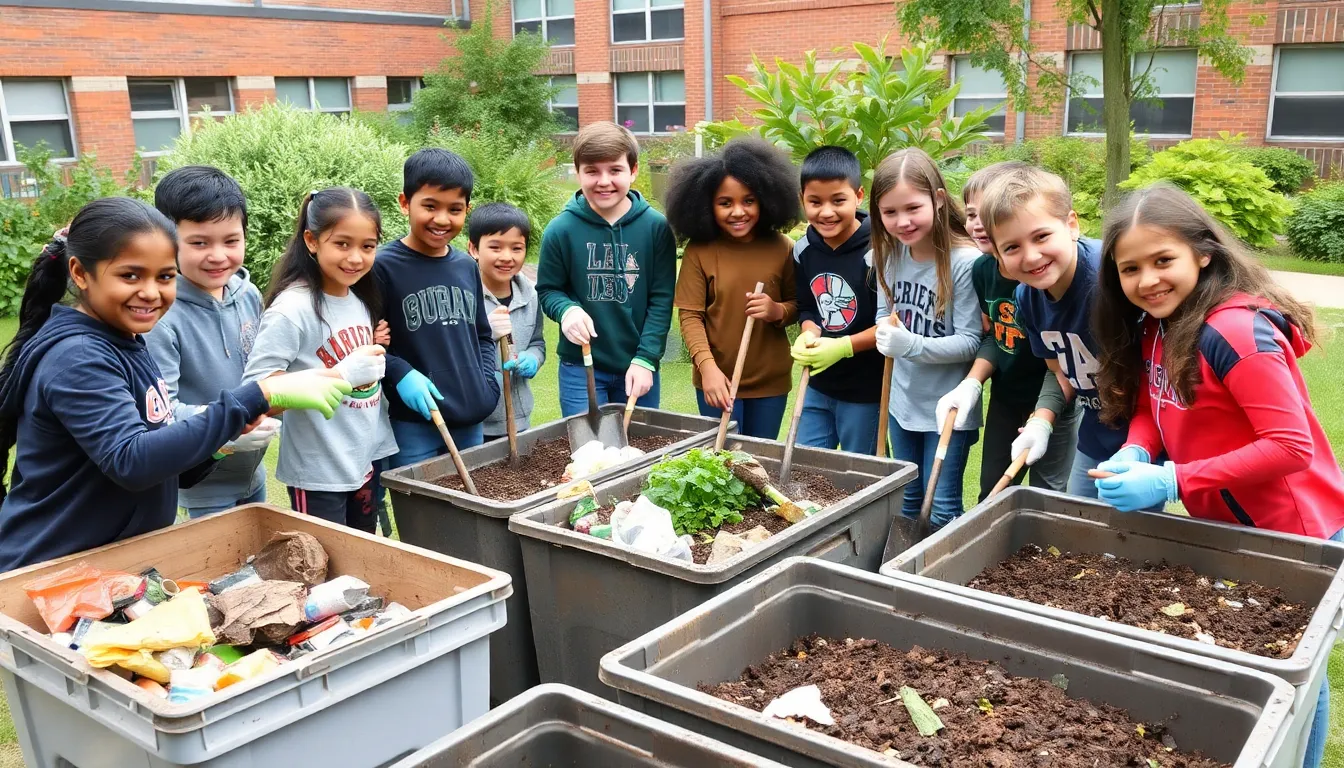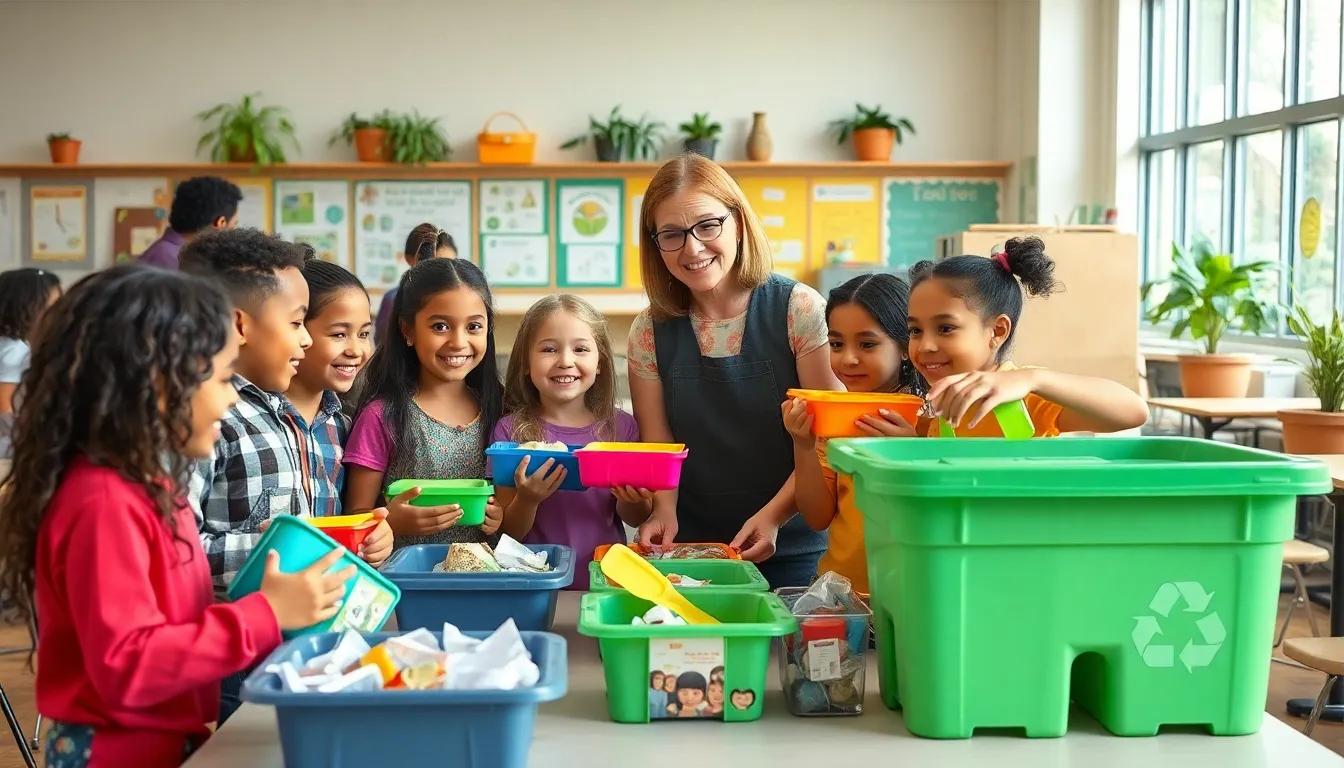Imagine a school where lunch trays aren’t just for holding food but also for saving the planet. Welcome to the world of zero waste schools, where students trade in their trash cans for treasure chests of sustainability. These innovative institutions aren’t just slashing waste; they’re cultivating a generation of eco-warriors armed with reusable water bottles and composting skills that would make any parent proud.
Table of Contents
ToggleUnderstanding Zero Waste Schools
Zero waste schools aim to eliminate waste through innovative practices and educational initiatives. They promote sustainability while nurturing environmentally conscious habits in students.
Definition and Principles
Zero waste schools focus on creating systems that minimize resources in landfills. Key principles include reducing, reusing, and recycling materials. Implementing composting programs and utilizing reusable supplies stands as foundational practices. Educational programs teach students the importance of waste diversion, aiming for a circular economy within the school community. Schools track waste reduction progress through audits, continuously enhancing their strategies.
Importance of Sustainability in Education
Sustainability in education fosters awareness of environmental issues among young people. It empowers students to take action in reducing their ecological footprints. Programs promoting sustainable practices enhance student engagement and create a sense of ownership in environmental stewardship. Integrating sustainability into curricula aids in fostering critical thinking and problem-solving skills. Future generations equipped with this knowledge will contribute to a healthier planet, ensuring long-term benefits for society.
Benefits of Implementing Zero Waste Schools

Implementing zero waste schools offers substantial benefits that enhance both the environment and educational experience.
Environmental Impact
Environmental benefits significantly arise from the reduction of waste in school settings. Schools minimizing their landfill contributions help lower greenhouse gas emissions. A decreased reliance on single-use materials conserves resources and energy, reducing the carbon footprint. By integrating composting, schools create nutrient-rich soil that supports local ecosystems. Tracking waste through audits allows institutions to adjust strategies effectively, promoting a culture of sustainability. Ultimately, zero waste practices contribute to healthier communities and foster a strong commitment to environmental stewardship.
Educational Advantages
Educational advantages abound in zero waste schools. Students gain hands-on experience with sustainable practices, enhancing their understanding of ecology. Lessons focused on waste management reinforce the principles of reducing, reusing, and recycling. Engagement increases as students participate in school-wide sustainability initiatives. Collaborative projects foster teamwork, encouraging students to develop critical thinking skills. By instilling eco-conscious habits early on, these schools prepare future leaders to make informed decisions about environmental issues. Overall, zero waste initiatives cultivate awareness, inspiring a generation committed to sustainability.
Strategies for Achieving Zero Waste in Schools
Implementing effective strategies enables schools to minimize waste while promoting sustainability. Key approaches include various waste reduction techniques, along with established recycling and composting initiatives.
Waste Reduction Techniques
Waste reduction techniques focus on minimizing the amount of waste generated within schools. One approach involves using digital tools for assignments and communication, reducing paper usage significantly. Another method encourages students to bring lunch in reusable containers, eliminating single-use packaging. Schools can promote the use of bulk purchasing to minimize excessive packaging in supplies, too. Developing a culture of sharing resources, such as sports equipment and educational materials, also contributes to waste reduction. Regular workshops educate students about the environmental impacts of waste and emphasize personal responsibility towards resource management.
Recycling and Composting Initiatives
Recycling and composting initiatives enable schools to divert waste from landfills. School recycling programs can include separate bins for paper, plastics, and metals, ensuring proper sorting. Engaging students in active recycling campaigns increases involvement and accountability. Composting initiatives convert organic waste into valuable soil, enhancing biodiversity. Schools may also collaborate with local farms or organizations to utilize compostable materials effectively. Regular assessments identify recycling rates and compost quality, guiding improvements in practices. Integrating lessons on the recycling process within the curriculum reinforces the importance of waste diversion and supports a circular economy.
Successful Case Studies of Zero Waste Schools
Several schools have implemented effective zero waste programs, showcasing innovative approaches to sustainability. These case studies illustrate the potential of educational institutions to lead in environmental stewardship.
Notable Examples
The Zero Waste School Project in California stands out with its comprehensive waste reduction strategies. This program involves detailed audits and targeted campaigns, resulting in impressive waste diversion rates. The Green School in Bali showcases a unique blend of local culture and environmental consciousness, utilizing bamboo architecture and engaging students in hands-on eco-projects. Hartford Public Schools in Connecticut support food recovery initiatives, redistributing surplus meals to local shelters while educating students about food waste reduction. Such initiatives highlight diverse strategies embraced by schools across the globe, demonstrating tangible impacts on waste management.
Key Takeaways
Zero waste schools exhibit transformative practices benefiting both the environment and student engagement. Schools effectively measure waste reduction through regular assessments, enabling them to refine strategies continuously. Engaging students in sustainability initiatives fosters responsibility and critical thinking skills essential for future leaders. Notable case studies provide inspiration for other institutions aiming for environmental excellence. Through collaboration with local communities, schools can achieve meaningful waste reduction goals. These examples emphasize the importance of integrating sustainability deeply into school cultures, ultimately creating healthier environments for students and surrounding communities.
Challenges and Solutions in Transitioning to Zero Waste
Transitioning to zero waste schools involves navigating various challenges. These obstacles can hinder the effective implementation of sustainability practices.
Common Obstacles
Limited funding often restricts resources for waste reduction programs. In many cases, staff members may lack training on sustainable practices. Resistance from students and parents may also arise due to established habits. Furthermore, inadequate recycling infrastructure can complicate correct waste sorting. Schools sometimes face challenges in engaging the community effectively, impacting program success and collaboration.
Practical Solutions
Implementing training for staff on sustainability can enhance program effectiveness. Schools benefit from reallocating budgets to prioritize zero waste initiatives. Partnerships with local businesses foster resource sharing and support. Engaging students through hands-on projects increases involvement and promotes a sense of ownership. Creating robust communication strategies informs families about transitioning efforts while soliciting their support. Adopting gradual changes allows schools to adjust their practices without overwhelming students or staff, paving the way for lasting sustainability.
Zero waste schools represent a pivotal shift towards sustainable education and environmental responsibility. By embracing innovative practices and fostering a culture of sustainability, these institutions not only reduce waste but also empower students to become proactive stewards of the environment.
The journey towards zero waste is filled with challenges, yet the determination of schools to overcome these hurdles showcases their commitment to a healthier planet. As more schools adopt these practices, they inspire communities and future generations to prioritize sustainability.
Through collaboration and education, zero waste schools are laying the groundwork for a more sustainable future, ensuring that students are equipped with the knowledge and skills needed to tackle pressing environmental issues.


